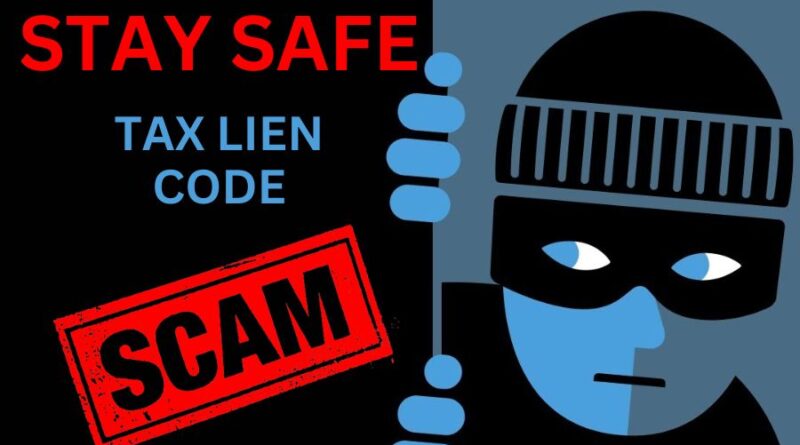Tax Lien Code Scams: What You Need to Know to Stay Safe.
Tax lien investing can be a lucrative opportunity for savvy investors, but knowing the potential for tax lien code scams is crucial. This informative blog post will guide you through tax lien investing and help you identify tax lien scams to make informed decisions and stay safe. Tax lien investing has become more popular in recent years, and unfortunately, so have the associated scams. As a result, knowing how to spot a tax lien investing scam is essential for anyone considering this type of investment.
What are Tax Lien Code Scams?
A tax lien code scam occurs when a fraudulent company, such as a fake Tax Lien Code organization, misleads potential investors into believing they are investing in legitimate tax lien certificates. These scams often involve high-pressure sales tactics, false promises of high returns, and a lack of transparency about the investment’s risks.
Understanding Tax Lien Investing:
Before delving into how to spot a tax lien code scam, it’s important to understand the basics of tax lien investing. When property owners fail to pay their property taxes, the government places a tax lien on the property. Investors can purchase these liens at a tax lien auction or from a third-party company specializing in tax lien investing. The property owner then has a set period to repay the taxes, interest, and penalties owed to the investor. If they fail to do so, the investor can take ownership of the property.
Warning Signs of a Tax Lien Code Scam:
- Unrealistic Promises: A tax lien code scam may promise unrealistic returns on your investment, such as a guaranteed double-digit return. While tax lien investing can yield high returns, there are no guarantees, and investors should be wary of any company making such claims.
- High-Pressure Sales Tactics: Tax lien scams often use high-pressure sales tactics, urging investors to act quickly or risk losing out on a once-in-a-lifetime opportunity. Legitimate tax lien investing companies will provide the necessary information and allow you to decide without pressure.
- Lack of Transparency: A tax lien code scam may need to be more specific about the investment details or the risks involved. Reputable tax lien investing companies should be transparent about the process and potential outcomes.
- Unsolicited Contact: Avoid unsolicited phone calls, emails, or social media messages promoting tax lien investing opportunities. Tax lien investing scam use this common tactic to lure in unsuspecting victims.
- Upfront Fees: A tax lien code scam may require you to pay upfront fees to access their list of tax lien properties or participate in their investment program. While some legitimate companies charge fees for their services, be cautious of high upfront costs and do your research before committing.
- Inadequate Customer Support: A tax lien code scam may need better customer service or be more responsive to your inquiries. Legitimate tax lien investing companies will typically offer excellent customer support, answer questions promptly, and address any concerns you may have throughout the investment process.
- Unverifiable Credentials: Scammers may claim to be experts in tax lien investing but must provide verifiable credentials or references. Always verify the qualifications of individuals or companies you’re considering working with, and look for professionals with a proven track record and established reputation in the industry.
- Fake Testimonials: Tax lien code scams may use fake testimonials or fabricated success stories to entice potential investors. Be cautious of testimonials that seem too good to be true, or that lack specific details and always seek out independent, verifiable reviews from other investors.
How to Protect Yourself from Tax Lien Scams:
- Research: Thoroughly research any tax lien investing company you’re considering working with. Look for reviews and testimonials from other investors, and check the company’s standing with the Better Business Bureau.
- Educate Yourself: Learn as much as possible about tax lien investing, including the risks and potential rewards. This knowledge will help you make informed decisions and spot any red flags associated with a tax lien code scam.
- Ask Questions: Be bold and ask questions about the investment process, the company’s track record, and any fees or costs involved. A legitimate tax lien investing company should be more than willing to answer your questions and provide the necessary information.
- Be Cautious with Personal Information: Never provide personal or financial information to an unsolicited caller or email sender promoting a tax lien investing opportunity. This information could be used to steal your identity or commit other types of fraud. Protect and only share your personal information with trusted and verified tax lien investing companies.
- Seek Professional Advice: Consult a financial advisor or attorney knowledgeable about tax lien investing before making investment decisions. These professionals can help you understand the risks and guide you through the process, potentially avoiding tax lien scams.
- Verify Property Information: Always verify the property information provided by the tax lien investing company. This includes checking the property’s ownership, tax lien status, and existing liens or debts. By doing your due diligence, you can avoid falling for a tax lien code scam involving a property that doesn’t have a tax lien or isn’t worth the investment.
- Be Wary of Guarantees: No investment is risk-free, and tax lien investing is no exception. Be skeptical of any company that guarantees specific returns or claims that there is no risk involved in tax lien investing. Tax lien scams use this common tactic to entice unsuspecting investors.
- Monitor Your Investments: Keep a close eye on your tax lien investments and maintain communication with the tax lien investing company. Regularly monitoring your investments will help you stay informed about any changes in the property’s status and ensure you’re aware of any potential issues or signs of a tax lien code scam.
- Trust Your Instincts: If something seems too good to be true or feels “off” about a tax lien investing opportunity, trust your instincts and proceed cautiously. It’s better to miss out on a potential investment than to fall victim to a tax lien scam.
- Report Suspected Scams: If you suspect that you’ve encountered a tax lien code scam, report it to the appropriate authorities, such as the Federal Trade Commission or your state’s attorney general’s office. By reporting these scams, you can help protect other investors from falling victim to them.
Conclusion
Tax lien investing can be profitable, but it’s essential to stay vigilant and informed to avoid tax lien code scams. By following these guidelines and doing due diligence, you can make informed decisions, minimize risks, and enjoy the potential rewards of tax lien investing. Staying informed and cautious is key to avoiding tax lien scams and ensuring a successful investment experience.




